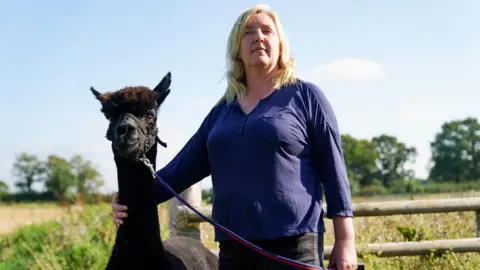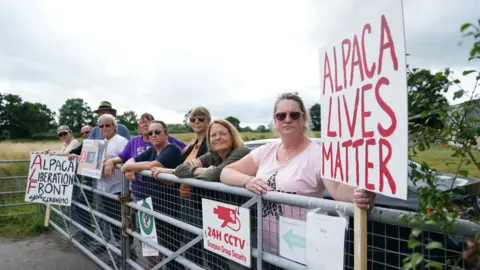Geronimo the alpaca should be studied not killed, vets say
 Press Eye
Press EyeLeading vets have called on the government to stop the culling of Geronimo the alpaca and urged he is studied for science instead.
The 13 vets, including a former senior government official, said they had "grave reservations" about two positive tests for tuberculosis he gave in 2017.
In a letter, they said the diagnosis was "unsafe" and he should be "compassionately studied" not killed.
A destruction warrant for Geronimo is valid until 4 September.
His owner, veterinary nurse Helen Macdonald, said his positive tuberculosis test was due to being repeatedly primed with tuberculin, a purified protein derivative of bovine tuberculosis (bTB) bacteria.
Vets who have signed the letter include Prof Ranald Munroe, the former head of pathology for the Department for Environment, Food and Rural Affairs' (Defra) Veterinary Laboratories Agency.
 PA Media
PA MediaThey said environment secretary George Eustice has the power to overturn Geronimo's destruction warrant and order he be observed for scientific research.
"We could learn a great deal from Geronimo were he to be compassionately studied, but very little from his death," they state.
"We believe Geronimo's case shines a light on the shortcomings of the current bTB testing policy, and gives an opportunity for a comprehensive review of the bovine TB testing and control policy, based on science and for the health and wellbeing of farmers, cattle, alpacas, badgers, the environment and the public."
Ms Macdonald, from Wickwar, near Bristol, said she hoped the government would "take notice" of the "quite significant" letter.
 PA Media
PA MediaLast week, a High Court judge refused an application for a temporary injunction to stop the destruction order and reopen the case.
A Defra spokesman said: "We are sympathetic to Ms Macdonald's situation - just as we are with everyone with animals affected by this terrible disease.
"While nobody wants to cull animals, we need to do everything we can tackle this disease to stop it spreading and to protect the livelihoods of those affected."

Follow BBC West on Facebook, Twitter and Instagram. Send your story ideas to: [email protected]
